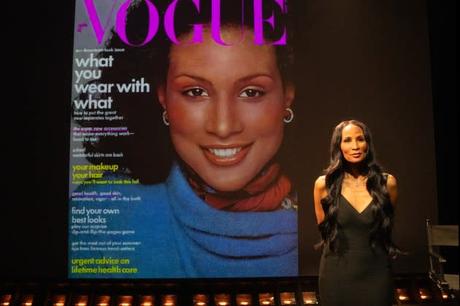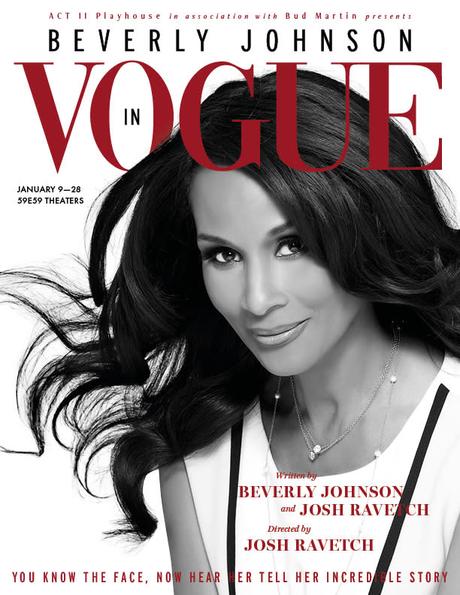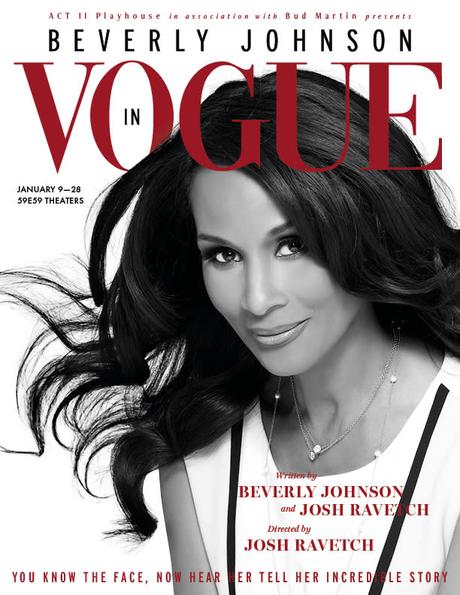
Fifty years after becoming the first black model to land a cover of Vogue, Beverly Johnson continues to move forward in the fields of business, entertainment and diversity.
Her achievements and challenges are highlighted in a just-opened one-woman show at 59E59 Theaters in New York. "Beverly Johnson in Vogue," which runs through Jan. 28, also explores her battle with substance abuse and allegations against Bill Cosby, who dropped a defamation suit against her in 2016. After the murder of George Floyd, Johnson proposed that fashion, beauty and media companies interview at least two black professionals for every vacancy. (The concept was proposed by her partner Brian Maillian and is derived from "The Rooney Rule," an affirmative action initiative enacted in 2002 by former Pittsburgh Steelers chairman Dan Rooney.)
More from WWDDuring an interview on Monday, Johnson was direct but self-effacing and easy-going, describing some of the most poignant moments of her life and charting the fashion industry. In addition to running a beauty company through Beverly Johnson Enterprises, licensing deals, and speaking engagements, she regularly appears on "The Barnes Bunch," the reality show starring her daughter Anansa Sims, ESPN analyst fiancé Matt Barnes, and six children. "I'm Mary Poppins - I come in and I come out," she said.
Johnson grew up as an "introvert, academic and participant on the first all-black swim team" and said she envisioned a career in law while attending Northeastern University. Watching coverage of the civil rights movement with her "news junkie" father had set her on that path. He also influenced her views on diversity. While serving in the military, Johnson's father learned four languages. Although he worked full-time as a steelworker, he filed his friends' taxes for free from the family kitchen table. "A Polish friend came in with a series of Polish sausages over his shoulder to take my father to do his tax return. An Italian friend would bring something different. I got that kind of worldly outlook from my father," she said. "They came in through the back door, even though we lived in an all-white neighborhood. It was as if the roles had changed. We used to have to enter through the back door. They were also friends. It made a very beautiful impression about diversity and the love of just people," she said.
The story continues
The strength required for competitive swimming - let alone the walks home from practice with wet hair (hand dryers didn't exist yet) in Buffalo's frigid winters - would later play a role in her professional modeling work. "I would become a lawyer. I'm an introvert and a nerd. I was on the honor roll. Every time I walked across the stage [to be honored], everyone would boo me. I was the first black cheerleader. I founded the first black student union," she said. "I wasn't beautiful. Girls who were beautiful were short, with big legs and a figure. I was tall, thin and flat-chested. I wore my hair in two braids all through high school. Nobody was after me," Johnson said.
Interested in AI and connecting across a range of generations, Johnson said: "I don't call it obsolescence. I call it 'pro-aging'. It's like a treasure hunt."
Johnson wrote the one-woman show a few years ago with playwright Josh Ravetch, whose credits include Carrie Fisher's "Wishful Drinking," "Onward: The Diana Nyad Story" and Dick Van Dyke's "Step in Time!" A musical memory." Before the pandemic hit, Johnson's show was well received at a workshop in West Hollywood, she said.
Think about how you are going to celebrate 50 e anniversary of the Vogue cover was difficult to take into account. "That's half a century. It's hard to even say sometimes," Johnson said.
Johnson said she has no idea why the cover happened (editorially overseen by Grace Mirabella). "I honestly think it was a fluke. In those days you never knew if you got the cover until you were on the cover," she said.
She was hired in the spring of 1974 for a beauty shot with photographer Francesco Scavullo, stylist Frances Stein, hairstylist Suga and Way Bandy doing the makeup. "There was definitely magic in the air. But there was magic to a great beauty photo," Johnson said. 'Someone just has the courage [to use the image for the history-making cover]."
Recalling the overwhelming response and interviewing media "from all over the world," Johnson said she only recently learned that Vogue would have done three production runs to meet demand. Resharing that and other personal stories, including those of adversity, makes people think "if she can do it, I can do it too," Johnson said.


Celebrating the groundbreaking Vogue cover "to give that moment in history that it deserves" was suggested indirectly by a gentleman through "Beverly's Full House," which used to air on the Oprah Winfrey Network, Johnson said. "You know what it's like, you don't want to blow yourself up, you want someone else to do it. But a closed mouth is never fed," she said. Despite always speaking out on thornier topics like depression, hysterectomies and menopause, focusing on her fashion milestone was a new connection.
Substance abuse and addiction are also addressed in Johnson's off-Broadway show, who pointed to the recent death of actor Matthew Perry (from acute effects of ketamine) as an example of "how insidious the disease has become."
"Recovery is sacred. What we learn in AA [Alcoholics Anonymous] is that it is not through promotion. It's an example. They think you shouldn't present it to the public. I'm still in AA, so I stuck to the rules. Every now and then it would slip out. Whenever someone asked if I wanted a drink, I said, "No, I never drink or do drugs." They'd be like, 'Huh, excuse me?'" she said.
Her audience "laughs with me, cries with me," she said.
As for progress in the fashion industry since Floyd's killing in 2020, Johnson said there has been some movement with the appointment of Black executives to boards of directors, but there is still work to be done. 'We still have such a long way to go. Every sector is a bubble in itself, but ours is a really tricky little bubble to get into," she said.
In terms of improving diversity, Johnson said laws are needed "to let people do the right thing. That way, if they don't, they have consequences." Johnson praised The Model Alliance and founder Sara Ziff for their support of the Fashion Workers Act, which calls for financial transparency and accountability in the modeling industry. "Listen, my agent, who I love, at Iconic Focus, or any other agency I've been with, there's no transparency. I don't know how much they get. I have to depend on them, and I do. I want to think everyone is honest. But transparency would be nice. It's like we're kids and I'm far from a child model. "I can take it," she said.
Johnson credited her father with teaching her to use her voice "when she had influence."
After babysitting one day, Johnson recalled "fighting this guy" after a man pushed her onto a bed and got on top of her. Nearly a decade later, Johnson said she confronted him and "looked him dead in the eye and said straight to his face, 'Have you been molesting little girls lately?'" she said. "That felt so good. He just got red and left. Confronting him gave me so much strength."
Johnson said Monday that the incident at age 12 led to her drinking alcohol for the first time and later "vomiting at school."
Johnson said sexual abuse is "a global dynamic" and recalled an experience with Cosby in which he claimed he drugged a cup of coffee he gave her. "It's a miracle that both times [referring also to the babysitting altercation] I got out of there without being raped. Who knows if you would be talking to me on the phone now if I had been raped. It shuts down women's lives - the trauma," Johnson said, adding that she is now dealing with her personal trauma by giving back.
The advocate and model sits on the board of the Barbara Sinatra Children's Center Foundation, where abused and sexually abused children are immediately supported with services.
Looking five years ahead, Johnson is reluctant to speculate on how the fashion industry might change. "I don't expect anything. All I'm doing is the little I can do: talking to you about or with a model who had a bad experience and ran away from it because she's traumatized. We're talking about young women, but it's not just young, petite models," Johnson said. "There are hairdressers and men. The modeling industry is the Wild West because waitresses and auto workers have unions. There are trade unions for industries. We are a trillion [dollar] industry, but there are no rules."
The best of WWD